

The six tissue terrains are imbalances in the biological terrain of the body. Although they are sometimes systemic, more often there are specific imbalances in the biological terrain of specific organs and systems. Our Biological Terrain Chart for the Hepatic System gives more specific indications that give you clues to the biological terrain imbalances that take place in the liver and gallbladder.
Here is a brief description of these imbalances and some of the herbal products and remedies available from Nature's Sunshine Products that can help to correct them.
Hepatic Irritation
The concept of excess heat or energy in the liver is a common problem and is recognized in both Oriental and traditional Western medicine. Liver heat usually involves some moderate liver congestion that causes chronic low grade inflammation in the liver tissue. The problem is not serious enough to be considered a true liver disease, but it does have some very distinct symptoms.
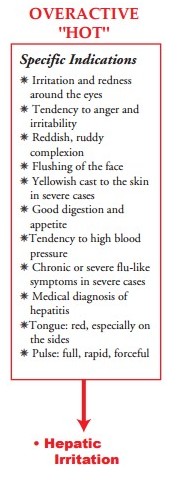 People suffering from irritation in the liver will be irritable themselves. They will be hypersensitive to light, sound and touch, and will tend to be cranky and easily angered or upset as a result. There is a tendency for headaches, especially severe ones like migraines. Another common symptom of people suffering from an overactive or hot liver is nervous energy late in the evening that keeps them from getting to sleep, followed by a groggy, almost "hangover-like" feeling in the morning. They tend to be late risers and slow to get started in the morning.
People suffering from irritation in the liver will be irritable themselves. They will be hypersensitive to light, sound and touch, and will tend to be cranky and easily angered or upset as a result. There is a tendency for headaches, especially severe ones like migraines. Another common symptom of people suffering from an overactive or hot liver is nervous energy late in the evening that keeps them from getting to sleep, followed by a groggy, almost "hangover-like" feeling in the morning. They tend to be late risers and slow to get started in the morning.
Flushing of the face, hot flashes, redness of the face or ears and bloodshot eyes can all be symptoms of excess heat or irritation in the area of the liver. When these symptoms rise up into the head from the liver, Chinese medicine calls this, "liver-fire rising." Hot flashes are often associated with liver fire and adrenal weakness.
Skin disorders (such as rashes, pox, hives and acne) are common with liver irritation. Disorders involving oily skin are particularly common. There may be a bloated or stuffy feeling under the right rib cage and pain in the middle back as well.
This problem is resolved by using herbs that "cool" the liver by helping to cleanse liver tissue and reduce "toxic overload" on the organ. Avoiding fatty rich foods, alcohol and food additives is also very helpful.
Hepatitis is a serious disease involving inflammation of the liver and is caused most frequently by a virus, although sometimes hepatitis may be caused by drugs/medications; alcohol abuse; bacterial, fungal or parasitic infections, or other toxins. Hepatitis causes damage or death of liver cells and can be acute (an attack that eventually heals with treatment and time) or chronic (ongoing difficulty). Hepatitis is the most common of all liver diseases and may have a connection with other degenerative diseases.
Hepatitis A is most often associated with contamination of food or water from fecal matter as it is shed through the intestinal tract in an active state. Its incubation period is from two to six weeks. In the United States, its occurrence is very high; up to 60 percent of adults have had Hepatitis A, most of whom are unaware that they have had it.
Hepatitis B is spread through direct blood contact and can be spread through sexual contact, contaminated needles and contaminated blood supplies. A carrier can be asymptomatic. Non-A and non-B hepatitis (including hepatitis C) are thought to spread through blood contact also.
Symptoms of hepatitis vary anywhere from mild flu like symptoms, nausea, jaundice and fatigue up to severe liver failure, coma and death.
Persons with serious inflammatory diseases of the liver can be helped through natural means, even if a complete cure isn't always possible. Begin by avoiding all substances that irritate the liver including alcohol, food additives, pesticides and other farm chemicals and spicy or rich foods. Diet should be bland, consisting of many non-starchy vegetables like zucchini, leaf lettuce, broccoli, etc. Take herbs that have a protective and cooling effect on the liver, and antioxidant nutrients. Drink plenty of pure water and keep the bowels open, but not with stimulant laxatives as these may irritate the liver.
To assess a less serious condition of liver irritation, look for a tendency to a reddish or ruddy complexion, along with a tendency to flushing of the face. There is also a tendency to irritation around the eyes. The tongue tends to be red, especially on the sides.
There are a number of herbs that will cool liver irritation.
Sam-e, Vitamin C and Milk Thistle Combination are all very good for hepatic irritation.
Super ORAC and Thai-Go can also be beneficial.
Helicrysum essential oil can be applied topically over the liver in cases of hepatitis as well.
Lactic acid (which is supplied by the friendly bacteria in the colon and is also present in cultured dairy foods, like yogurt and kefir) can help to cool liver irritation.
Lemon water will also cool the liver, as will black cherry juice. MSM, SAM-e, can help open liver detoxification pathways.
Avoid harsh liver cleansers and stimulant laxatives with liver irritation.
With inflammatory conditions, also avoid tonic herbs like ginseng.
Since the liver stores nutrients and helps to filter the nutrients being absorbed by the intestines, moderate weakness in the liver results in two major categories of symptoms. First, imbalances in blood levels of nutrients are likely to occur. For example, there is typically a liver weakness component in hypoglycemia.
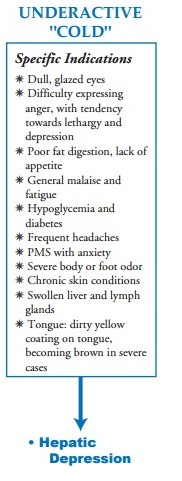 Second, toxic irritants will get past the liver and enter the blood stream, resulting in a wide range of toxic symptoms. Feelings of fatigue and general malaise, severe body odor and chronic skin problems are examples of symptoms in this category.
Second, toxic irritants will get past the liver and enter the blood stream, resulting in a wide range of toxic symptoms. Feelings of fatigue and general malaise, severe body odor and chronic skin problems are examples of symptoms in this category.
The physical symptoms of chronic liver weakness are vague and difficult to define. Furthermore, since it is very difficult to medically diagnose chronic liver weakness, the person with this problem often goes to many doctors and finds no answers to their vague symptoms. Hence, they may be labeled as a hypochondriac or develop feelings that it is "all in their head." According to Dr. Rudolph Ballentine in his book "Diet and Nutrition" it is the liver patient, whom a busy and baffled doctor is most likely to call a hypochondriac. He suggests that because the liver is located in an area of the body known anatomically as the hypochondrium, the doctor is making a correct diagnosis without realizing it. So, anytime someone acts like a hypochondriac or expresses feelings that he or she may be one, suspect the liver.
The emotional symptoms associated with liver weakness may be even more definitive than the physical symptoms. Liver weakness generally results in chronic feelings of discouragement, despair and depression. It may also result in an inability to get angry, even when someone violates a person's boundaries.
Here are some of the specific symptoms one might expect to see with liver depression. Frequent headaches and general malaise are common symptoms of liver depression. Chronic skin conditions, severe body or foot odor and PMS symptoms often result from the toxicity associated with liver depression. There is usually difficulty expressing anger, even when it is warranted, and feelings of discouragement, depression or even despair may be common.
Herbs that can help to stimulate weak liver function include dong quai, feverfew, rosemary and turmeric.
Turmeric/Curcumin and Blood Stimulator are two of the best NSP formulas for stimulating liver function.
Fat metabolism is often a problem with liver depression. SF can be used to improve the liver€™s ability to process fats. Avoid over cleansing in cases of liver weakness, especially when there is serious depression, anemia, fatigue and general weakness.
B-complex vitamins and sulfur compounds like MSM and indole-3-carbinol can aid sluggish liver function.
These substances enhance liver detoxification. N-acetyl-cysteine and SAM-e are also helpful for improving liver function.
Hepatic Stagnation
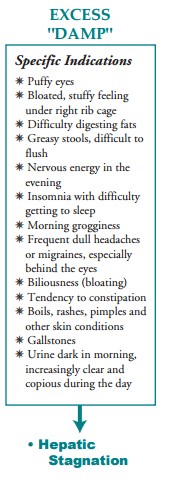
Probably the most common liver problem people have is liver stagnation. Since the liver derives a large portion of its blood supply from a vein (the hepatic vein), any congestion of the blood and lymph is likely to have a direct and immediate effect on the liver.
When the liver is congested and stagnant there is a bloated stuffy feeling under the right rib cage. It may feel "puffy" and be slightly tender to the touch. Bloating and gas are common, and there is a tendency to constipation due to a lack of bile production. In addition, the lack of bile production will impair fat digestion which can result in greasy or clay-colored stools. Greasy stools have a sheen to them, float in the toilet, and are very hard to flush. They show that fats were not properly digested and were flushed out with the stool instead. Hepatic stagnation also leads to headaches, particularly migraines. The headaches are often felt behind the eyes. (In Chinese medicine the eyes are related to the liver.) There may also be frequent dull headaches.
One of the most interesting symptoms of liver stagnation is insomnia characterized by difficulty getting to sleep. There is typically a pattern of nervous energy in the evening, followed by a dull, hung-over feeling in the morning. The person has difficulty waking up and feels groggy and dull.
A person with liver stagnation can also vacillate back and forth between symptoms of liver irritation and symptoms of liver depression. This can cause mood swings from irritability and anger to depression and withdrawal.
Bitters are generally helpful to the liver, and they are especially helpful for liver stagnation. These herbs not only help to remove congestion from the liver, they also stimulate the flow of bile, improving fat digestion and bowel function. Improved bile flow can also help to prevent and eliminate gallstones.
Some bitter herbs very helpful for liver stagnation include dandelion root, Oregon grape root, burdock and yellow dock. Liver Balance is probably the best NSP formula for liver stagnation, followed by EnviroDetox and Milk Thistle Combination.
The goal of coffee enemas is to flush the liver, but bitter herbs made into a decoction, or added as tinctures or extracts to an enema solution, can be equally effective and less stimulating. A gall bladder flush can also help with liver stagnation that is accompanied by gallstones.
Hepatic Atrophy
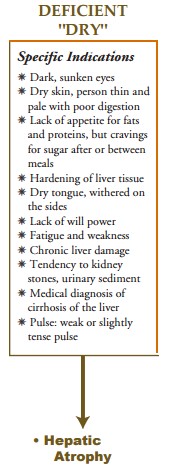
In its most serious form, hepatic atrophy results in cirrhosis of the liver. Cirrhosis is a serious condition involving inflammation, degeneration and scarring of liver tissue. Cirrhosis is irreversible and often fatal, although the progress of the disease can be slowed or stopped. Half of all cirrhosis of the liver is caused by alcohol abuse, which often affects women more than men. Cirrhosis can also be caused by lack of magnesium, hepatitis virus, some autoimmune disorders, poisons, and liver inflammatory diseases.
Cirrhosis of the liver often has no overt symptoms until the scarring damage to the tissues has become dangerously advanced. Then swelling, pain, jaundice, bruising and vomiting of blood can suddenly appear. Advanced stages may lead to severe symptoms, coma and death.
SAM-e, milk thistle, and Helicrysum essential oil applied topically over the liver are helpful both for cirrhosis and hepatitis.
In cases of less severe hepatic atrophy the symptoms may not be as recognizable. Some possible symptoms to look for include a lack of appetite for fats and proteins but a craving for sugar after or between meals. Also look for a dry tongue, which may have a withered appearance on the sides. There may also be a tendency to kidney stones and urinary sediment.
Herbs that can help with hepatic atrophy are more nourishing and less cleansing to the liver.
These include burdock, chickweed, licorice, milk thistle, schizandra, wood betony and wild yam.
Blood Stimulator is the best NSP formula for this condition, but LIV-J is also good.
Good fats are very helpful for liver atrophy, especially the omega-3 essential fatty acids.
N-acetyl-cysteine increases levels of glutathione, an extremely important antioxidant that can help protect the liver against toxins.
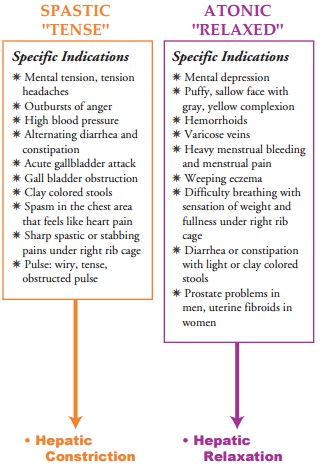
Probably the key symptoms to look for in cases of hepatic constriction are a spasm in the chest area that feels like heart pain, or a sharp or stabbing pain under the right rib cage. These often indicate gall bladder attack.
If the stools are clay colored, then the gallbladder may be obstructed, as bile colors the stool.
Remedies that may help relax the gallbladder and liver and relieve the constriction and pain include lobelia, blue vervain and wild yam.
Magnesium may also be helpful.
Gall Bladder Formula is also useful.
Epsom salt baths may be helpful, as may a gall bladder flush using Epsom salts.
Hepatic relaxation is closely related to hepatic stagnation. Several diseases suggest that the liver has lost tone, including: varicose veins, hemorrhoids, heavy menstrual bleeding, diarrhea with light colored stools and weeping eczema.
Astringent herbs like bayberry, butcher's broom, pau d'arco, sage and white oak bark can be helpful here.
Bioflavonoids and vitamin C can also be helpful.
Vari-Gone is a great formula for liver relaxation.
|